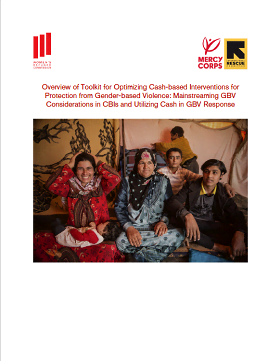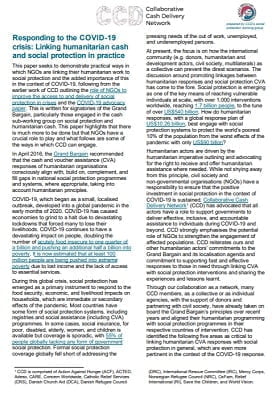Genre et inclusion
Au fur et à mesure que les transferts monétaires continuent à se développer, les parties prenantes demandent une meilleure prise en compte des problématiques de genre et d’inclusion car « des transferts monétaires sensibles au genre qui tiennent compte des disparités et répondent équitablement aux besoins de toutes les personnes affectées par une crise ont le potentiel d’avoir un impact positif sur les femmes et les filles en les protégeant davantage et en favorisant leur autonomisation, tout en renforçant les impacts spécifiques au secteur, qui peuvent rendre les ménages et les communautés ayant vécu une crise plus résilient·es et plus autonomes. » (Directives pour le chantier du Grand Bargain sur les transferts monétaires et le genre). La pandémie de COVID-19 a accru l’urgence de l’assistance car elle a affecté les femmes et les groupes exclus en particulier en augmentant la charge de travail de soin, en réduisant les opportunités d’emploi de manière disproportionnée et en exposant les femmes à des difficultés financières plus fortes et à davantage de violences basées sur le genre.
Le CALP Network continue d’ancrer son travail sur le symposium #GenreEtTransfertsMonétaires organisé en 2018 à Nairobi et sur l’engagement inscrit dans le programme pour l’action collective (Agenda for Collective Action) qui en a résulté. Le rapport « La situation mondiale des transferts monétaires en 2020 » fait état de progrès notables en matière de genre et de transferts monétaires, alors que ce domaine était marqué par des lacunes importantes en matière de données probantes dans le dernier rapport. De nouvelles directives ont été produites sur le genre et les transferts monétaires, ainsi que le genre et les VBG, et des efforts ont été réalisés en termes de synthèse et d’identification de données probantes plus rigoureuses. L’attention, portée initialement aux VBG, s’oriente désormais vers l’égalité entre les genres et l’adaptation de la programmation afin qu’elle ne tienne plus seulement compte du genre mais intègre cette problématique de manière transversale, et même transformatrice. Toutefois, bien que nous remarquions des progrès au niveau technique partout dans le monde, cela ne s’est pas traduit par des changements ancrés en termes de planification, de mise en œuvre et de suivi.
Priorités actuelles
Nous continuerons à travailler étroitement avec les responsables du chantier auxiliaire du Grand Bargain sur les transferts monétaires, CARE et ONU Femmes pour mettre en œuvre le plan de travail. Le CALP Network va continuer à encourager les acteurs de l’assistance monétaire à prendre en compte davantage de problématiques afin d’être plus inclusifs, et de favoriser une meilleure compréhension de la manière dont nous pourrions utiliser les transferts monétaires pour ne pas nous contenter de ne pas nuire mais aussi lutter contre ces inégalités socio-économiques par le biais de la prestation d’autres services et modalités de soutien.
Contenu associé

Collected Papers on Gender and Cash Transfer Programmes in Humanitarian Contexts
Report
Existing gender inequalities mean that disasters and conflicts impact women, men, girls and boys differently. Cash based assistance is one of the most significant developments in humanitarian assistance in recent years. But the relationship between gender and cash based assistance in humanitarian contexts is poorly understood. All too often, interventions are designed based on assumptions...

Guide for Protection in Cash based Interventions
Guidelines and Tools
This guide identifies minimum necessary information and key resources needed to help humanitarian practitioners ensure that protection risks and benefits are considered and monitored throughout the cash-based interventions (CBI) program cycle, using a community-based approach and participatory methods as much as possible. It can help to inform CBI in any program context: protection...

Microlearning video: CVA and Gender
Blog Post
This video provides an overview of the relationship between gender and cash and voucher assistance (CVA) structured around the humanitarian project cycle, which include: Assessment and response analysis: How to adjust the assessment processes to achieve a more accurate reflection of gender and markets. Design and implementation: How to use methods and protocols to reduce the potential...

Better Gender Outcomes in Food Assistance through Complementary and Multi-Modal Programing: Promising Practices Tip Sheet
Guidelines and Tools
This Tip Sheet is excerpted from the research report, “Better Gender Outcomes in Food Assistance through Complementary and Multi-Modal programming,” and gives promising practices by the cycles of project cycle management, as well as at the response level. Additionally, there are expert tips and wisdom practices that support the use of a gendered approach in development or humanitarian...

Cash & Voucher Assistance and Gender-Based Violence Compendium
Guidelines and Tools
The Compendium is intended as a companion to the 2015 Inter-Agency Standing Committee (IASC) Guidelines for Integrating Gender-Based Violence Interventions in Humanitarian Action and its companion resource, the GBV Pocket Guide. The guidance was developed through the efforts of 15 organizations who contributed expertise in the inception, design and review of the document. The process was led...

Cash and Voucher Assistance that Works for Women: 6 lessons from the field
Report
Building on CARE’s commitment to be ‘cash ready’ to achieve breakthroughs with and for women and girl, CARE commissioned a study –in Malawi, Haiti, Jordan, the Philippines and Niger–on gender-sensitive CVA that allowed actual CVA recipients to frame the discussion. This is a brief from the research “What Does Gender-Sensitive Cash and Voucher Assistance Look Like?” and presents...

Toolkit for Optimizing Cash-based Interventions for Protection from Gender-based Violence
Guidelines and Tools
Efforts to prevent and respond to GBV should be a priority for all actors in all humanitarian response operations from the very start. By mainstreaming GBV considerations in CBIs throughout the program cycle and by utilizing cash within GBV case management services, cash can be optimized as a tool to enhance the protection of crisis- and conflict-affected populations and to mitigate risks of...
Thematic lead
Contenu récent

Inclusive Information Systems for Social Protection: Intentionally Integrating Gender and Disability
Policy paper
Digital information systems serving the social protection sector, and especially social assistance, are increasingly prominent and will continue to be, as is the case within all other sectors. “Why? Because the ability of a country to care for its people and respond to their lifecycle needs depends on...

UNFPA Cash Assistance to Support Individual Protection Needs in Northwest Syria
Report
As part of humanitarian programming in northwest Syria, through cross-border operations managed from Turkey, UNFPA provided one-off, unconditional, Individual Protection Assistance (IPA) in the form of cash disbursements to 10,074 vulnerable Internally Displaced Persons (IDPs) to cover the costs of their...

2020 Cash and Voucher Programming (CVP): Roadmap and milestone achieved
Report
In 2020, World Vision has implemented cash and voucher programming like never before – not least due to the COVID-19 pandemic and related social protection transfer scale-ups. From 2019 to 2020, we have seen a 28 % increase of our cash, voucher based programming, moving towards enabling affected...

Better Gender Outcomes in Food Assistance through Complementary and Multi-Modal Programing
Report
There is now widespread recognition and evidence that CVA can have highly positive socio-economic impacts, ranging from poverty reduction and improved living conditions to enhanced psychosocial well-being. Despite such steps toward food assistance programming that fosters dignity and choice and stimulates...

Améliorer les résultats du genre dans l’assistance alimentaire grâce à une planification complémentaire et multimodale pratiques prometteuses fiche-conseils
Guides et outils
Cette fiche-conseils est issue du rapport de recherche intitulé « Better Gender Outcomes in Food Assistance through Complementary and Multi-Modal programming ». L’étude a cherché à répondre à la question : « Comment les processus de conception, de mise en oeuvre et de suivi des projets...

Cash Transfers and Women’s Economic Inclusion: Experimental evidence from Zambia
Case Study
This paper investigates whether an increase in exogenous income through the Child Grants model of the Social Cash Transfer programme in Zambia fosters economic inclusion among rural women. We conceptualize economic inclusion as a transformative process comprised of four pillars: productive capacity,...

Cash and Voucher Assistance Guidelines for Lao PDR
Guidelines and Tools
Cash and voucher assistance is becoming increasingly popular in Lao PDR in delivering humanitarian assistance, rehabilitation and development focused projects. In supporting the cash and voucher assistance agenda in Lao PDR, the Cash Working Group was established as a working group for local and regional...

Cash and Voucher Assistance for Adolescents: An evidence review of how cash and voucher assistance can achieve outcomes for adolescents in humanitarian settings
Report
During crises, the institutions, systems and community cohesion that normally support adolescent development break down. Humanitarian response often fails to take the necessary steps to mitigate and counteract the disadvantages that adolescent girls and boys in crisis face – including access to...

Cash transfer and child protection: An integrated approach to address the needs of unaccompanied and separated adolescents in the Central African Republic
Report
This report assesses Plan International’s Monetary Transfer and Child Protection Project in Central African Republic. It aims to understand the strengths and weaknesses of the programme, including implementation challenges and successes, benefits and associated risks for beneficiaries,and to identify...

Cash Transfer and Education: Supporting basic education for Syrian refugees and Egyptian host communities
Report
This report assesses Plan International’s Tawasol: Learning for Coexistence Project in Egypt to understand its strengths and weaknesses, including implementation challenges and successes, risks and benefits for beneficiaries, and any needs for continued capacity building. Plan International – with...

Cash. Dignity. Agency.
Video
Watch the videos here Displaced people face higher rates of gender-based violence before, during, and after they are forced to move. The Women’s Refugee Commission (WRC) explores how cash transfers can be used in response to gender-based violence and its potential to help displaced persons, including...

Cash and Voucher Assistance, Gender Equality and Gender-Based Violence Integration in Humanitarian Response Plans: Venezuelan Refugees and Migrants Case Study
Report
The case study was created with the inputs of the Regional Cash Working Group, supported by CashCap, and UNWOMEN’s regional gender focal point in the Response for Venezuelans. It demonstrates an example of meaningfully integrating gender and cash and voucher assistance at a response level. In October...

Establishing a Cash Working Group and GBV Sub-Cluster task force: NW Syria Case Study
Report
The case study was created with the inputs of two Cash Working Group leads and the GBV Turkey cross-border Sub-Cluster leads in the Northwest Syria response. The case study demonstrates an example of meaningful linking of gender-based violence response and cash and voucher assistance. As Cash and Voucher...

Gender Equality and Gender-Based Violence Risk Mitigation in Cash and Voucher Assistance: Vanuatu Case study
Report
The case study was created with the inputs of Oxfam Vanuatu and UNFPA Vanuatu. It demonstrates the meaningful connection of cash and voucher assistance and gender at a response level. Vanuatu is one of the world’s most remote locations and particularly vulnerable to cyclones and other natural hazards....

Gender Equality and Cash and Voucher Assistance: Tools and guidance
Guidelines and Tools
With the continuous uptake and scaling of cash and voucher assistance (CVA), it is more critical than ever that humanitarian and development actors shift their focus away from measuring gender mainstreaming and gender equality efforts by metrics (e.g. targeting at least 50% women), towards strategically...

Gender Based Violence and Cash and Voucher Assistance: Tools and guidance
Guidelines and Tools
There is increasing momentum among Gender-Based Violence (GBV) and Cash and Voucher Assistance (CVA) actors in the humanitarian sector to consider linkages between GBV and CVA in all CVA projects at all stages of the project cycle.
Integrating gender and CVA was set as a priority action under the Grand...

Responding to the COVID-19 Crisis: Linking humanitarian Cash and Social Protection in practise
Report
This paper seeks to demonstrate practical ways in which NGOs are linking their humanitarian work to social protection and the added importance of this in the context of COVID-19, following from the earlier work of CCD outlining the role of NGOs to
improve the access to and delivery of social protection in...

CVA and GBV webinar series for gender and cash subworkstream 2020
Webinar recording
Cash and voucher assistance (CVA) is now a common tool in humanitarian action used to meet the diverse needs of those displaced by crisis and conflict, and it is on the rise. Despite a push by several humanitarian actors since 2015, its use for protection outcomes – including to support the prevention...

Presentation for the CALP Network’s webinar on remote registration and verification in the COVID-19 response
Presentation
Watch the webinar recording here Speaker presentations from the CALP Network’s 14 July 2020 webinar on: Peril or pitfalls?: Emerging practices on remote registration and verification in the COVID-19 response Remote CVA programming has been highlighted as a key challenge for the community of practice in...

COVID-19: Invest now in cash/voucher-social protection scale-up or children pay the price later
Report
Read the article here. Only socially accountable Social Protection Assistance beyond humanitarian cash/voucher programmes – if properly and quickly implemented – will protect generations of children from the aftershocks of COVID-19. Despite cash and voucher transfers becoming the tool of choice of...




